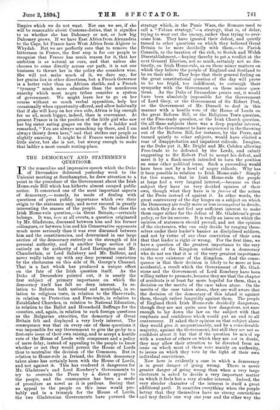TOPICS OF THE DAY.
THE IRRITABILITY OF FRANCE.
WE cannot remember in history a relation between two States so singular as that which at the present moment exists between Great Britain and France. It is like a quarrel between a man and a woman, when the man will not be offended, and the woman will not cease from offence. The British Government has not the smallest desire to annoy France, or affront France, or even restrain France in any of her legitimate aspirations. If she can recover her provinces without destroying Italy, or opening up an era of recurrent wars, let her recover them. That is not a matter which in any way affects English interests, even as those interests are regarded by the official class. If France sees her way to Colonies, let her found Colonies, even if she makes of Indo-China or the glorious island of Madagascar, a dependent Empire. If she desires to ex- ploit new tropical regions, let her exploit them as fast and as profitably as she pleases. The single condition is that she shall give us the freedom she takes for her- self, and leave England as much alone as England desires to leave her to her own devices. As for the British people, they are even more friendly than the Government, and are no more inclined to harass France, or plot against France, or restrain France, than they are inclined to resist the internal development of the 'United States. They cannot even fully realise that France is in a fever of annoyance. The dangerous temper is all on the other side. The directing classes of France, including, we fear, many of her statesmen, are persuaded that the secret of all English action abroad is to humiliate France, or restrain France, or deprive France of advantages to which she is entitled. We cannot take a step in Egypt, even if it be the irrigation of a new area of derelict land or the conversion of part of her Debt, without Frenchmen declaring that the object of the proposal is to injure France. and resisting it until it is laid aside. All the poli- ticiaus of Paris who concern themselves with foreign affairs declare that their Government ought to resist Great Britain far more energetically, and M. Flourens, who has been a Foreign Minister, calls her the general "Peril," by which he means cause of peril, and urges all Europe to combine and deprive her of her power. So savage is the feeling, that it extends to cases in which France suffers absolutely nothing except the loss of a territory which fifty years hence she may. desire to have. The natural dependency of France, if she can in any way square Italy and Spain, is, of course, North Africa, and she is getting it mouthful by mouthful at every fresh opportunity. Hereafter she may also get the vast territory known as the Congo State, for it overloads Belgium, and if Belgium wishes to part with it, France has by Treaty the first claim to the reversion. Because, however, Great Britain cedes to Italy a territory in the extreme East of Africa, and leases from Belgium a territory on the Lakes, where France has not a soldier or a Colonist, the French directing classes are all in arms. It is not even pretended that France owns either territory, or knows when she may own them ; but because her desert possession, the French Soudan, may stretch some day to Abyssinia, and because if Belgium fails on the Congo, and France acquires the State, she may wish for the territory between Lake Albert and Lake Tanganyika, furious despatches are written, and in Paris public opinion is agitated by violent diatribes against England, who is described, to the amazement of Englishmen, as pursuing an unfaltering, unrelaxing policy of aggrandisement. It is the custom in this country to treat these ebulli- tions mainly as diplomatic tricks intended either to make us uncomfortable in Egypt, or to secure an offer of com- pensation; and no doubt that is occasionally the true explanation. The French cannot forget that Napoleon once conquered Egypt, or that M. de Lesseps cut the Suez Canal, and they hardly know how to bear seeing the Delta occupied by British troops, and the Canal chiefly used by British steamers. They are, moreover, persuaded that every claim they can raise, whether in Siam or Africa, or the Pacific, will increase the British readiness to evacuate Cairo, and so restore the" possibility of friendship between two great Powers." These two ideas are not, however, the sole source of the discontent. Another and a deeper source is envy at the development of Great Britain, accompanied as the development is by a certain British jealousy of progress by any other nation. We must say that we think this. source of discontent natural, and even justifiable. The French think, and have a right to think, that they have as much right to a bit of the world as the British, and they deny altogether that they cannot colonise. They colonised Canada, they say, quite as well as we did ; and they, and not we, made Louisiana ; while they can administer tropical regions quite as well as we can. They cannot, it is true,. just now send out myriads of Frenchmen to settle any- where, but they manage their West India islands without trouble, La Reunion flourishes as much as the Mauritius ; and no British African possession looks to them so civilised as Algeria. Where have the British a State Opera House ? So thinking, it is to them most vexatious to see England always before them, seizing Burmah, just as they hoped to get it, converting the Malagasy just as the Catholic Mission began to prosper, making alliances with China, when France wants Chinese friend- ship in Tonkin, and seizing island after island in the Pacific just when France would be pleased to think that she had picked up another Tahiti or two. In Africa, too,. France feels herself cut out. We are picking up province after province, each as big as France, each represented as. fertile, and full of gold and diamonds, while France gets. nothing except Tunis and an arid "hinterland" with, as. Lord Salisbury epigrammatically and foolishly said, a. very thin soil. France, beaten at present, is condemned to dream of the future ; and even in her dreams she finds.
England in her way. She hoped to stretch her Soudan to the Nile and the Red Sea, and here is England giving Italy territories which will be directly in her path. She hoped to acquire the Congo State and stretch right across Africa, and here is Mr. Rhodes running his wires, and per- haps his railroads and steamers, right up from the Cape to Cairo, rendering the "just expansion" of France, when the time arrives, either impossible, or possible only at the cost of a great war. The excitement has spite in it, but it is. natural too. We need not say that the British are not expanding in order to spite France, which, indeed, in Africa we hardly remember ; but still, as matter of fact, we do expand at a prodigious rate—a rate which, if we realised it fully, would amaze and perhaps alarm our-. selves—and we are very often very much in the way of France. But for us she would have a grand Indo- Chinese Empire stretching from Mandalay to the Malayan. Peninsula. But for us she might have had Egypt. And but for us she would have inevitably the Empire of Morocco, and reign undisputed mistress of that section of Northern Africa which belongs geographically and geologi- cally to the European Continent. It is a splendid destiny to have lost, after Gambetta had dreamed it out, and to know that it is lost, and then hear those hypocritical English declaim against annexation, and declare that they swallow Empires only to make them better, is almost. unendurable. The French directing classes feel about it as Anglo-Indians feel about Russian progress in Northern Asia. They cannot believe that the British advance is- effected without deep design, or that there is not in it a. menace which it concerns their honour as well as their future safety to meet early, and with an energy which has behind it a threat of war. That Lord Rosebery should, in making an arrangement, say, with Italy, forget France, is to them inconceivable,—as inconceivable as. we should think it for Russia, when making her last arrangement with Persia, to forget Great Britain and British India. Yet we are not at all sure that in both cases there was not the same recollection only of imme- diate interests and difficulties to be overcome. It is a. little comic, to be sure, to see France horror-struck because Abbas II. has lost a province he never possessed,. and because the "Emperor Menelek's " dignity has been affronted ; but still that is only a way of saying that France is much annoyed that England should presume to. divide Kingdoms without her assent.
Whether there is a remedy for this state of feeling, we do not know, though we cannot help fancying that if Africa is to be treated, as we certainly treat it, as a. derelict Continent to be divided among any white occu- piers who like to "rush" a province or so, compensations which Frenchmen would acknowledge to be such, might be found for France. We have always contended that Morocco, Tangier excapted, b3longs fairly to her share, and in that huge territory of which Senegambia is the centre, there is room and population for a dependent tropical Empire which we do not want. Nor can we see, if she will be reasonable about Customs-duties, that it signifies to us whether she has Dahomey or not, or how big Dahomey grows. If we have East Africa from Alexandria to the Cape, let France have West Africa from Algiers to Whydah. But we are perfectly sure that to remove the bitterness in France, the first step is for our people to recognise that France has much reason for it, that her ambition is as natural as ours, and that unless she chooses to come directly across our path, it is not our business to thwart her in the policy she considers wise. She will not make much of it, we dare say, for her genius lies in other directions, but a French Governor is a better ruler than an African sheikh, and a French " tyranny " much more educative than the murderous anarchy which most negro tribes consider a system of government. We might leave her to go on her course without so much verbal opposition, help her occasionally when opportunity offered, and allow habitually that if she will keep on her Own side, Africa is big enough for us all, much bigger, indeed, than is convenient. At present France is in the position of the little girl who saw her big sister eating grapes on the top of a ladder and remarked, "You are always munching up there, and I am always thirsty down here," and that strikes our people as slightly amusing. It might be if France were indeed the little sister, but she is not, but strong enough to make that ladder a most unsafe resting-place.







































 Previous page
Previous page